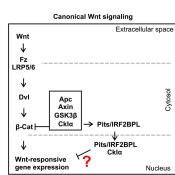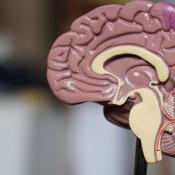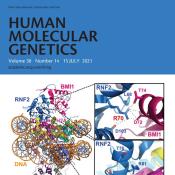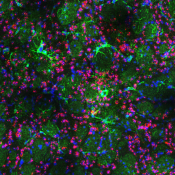Research Breakthroughs
Disruptions in brain sphingolipid metabolism reveal new insights into cause of Gaucher disease
7/14/22A study by Bellen lab researchers is the first to associate neuronal activity to the levels of sphingolipids, a type of fat, in brain cells.
A pioneering study discovers an underlying cause for infantile spasms and points to a novel therapy
5/11/22An exciting new study by Dr. Carlos Ballester-Rosado and others in the Swann lab finds an underlying cause and a potential new therapy for infantile spasms.
Texas Children’s Hospital and Baylor College of Medicine study opens the door to improved diagnosis, prognosis and potential therapies for EBF3 and other neurodevelopmental disorders
4/20/22Dr. Chao and her team have discovered that patients with EBF3 gene variants affecting a critical region — zinc finger domain (ZNF) of the encoded transcription factor protein — suffer from a more severe subtype of EBF3-related neurodevelopmental disorders and other autism spectrum disorders.
Oleic acid, a key to activating the brain’s ‘fountain of youth’
3/25/22Many people dread experiencing the cognitive and mood declines that often accompany reaching an advanced age, including memory disorders such as Alzheimer’s...
Fruit fly study uncovers functional significance of gene mutations associated with autism
3/15/22In this exciting study, Drs. Yamamotoand Wangler discover a new insight about autism spectrum disorders that it may not be one disorder involving many genes., but may actually be hundreds of genetic disorders.
Reduced inhibition of hippocampal neurons impairs long-term memory recall in Rett syndrome
3/14/22In this exciting study, the Zoghbi lab find the cause and how to improve poor memory recall in Rett mice.
An atypical case underscores the importance of ‘silent’ synonymous genetic changes
3/13/22Chao lab study an unusual clinical case of NMIHBA case provides insights into this rare disease.
Loss of TIAM1 protein leads to a novel neurodevelopmental disorder
3/11/22Bellen lab finds a new neurological disorder.
Molecular profiling of meningioma can lead to improved prognosis and therapy
2/4/22Reliably predicting whether meningioma, the most common primary brain tumor, will recur or remain benign has not been easy. In this study, published in Science Advances, researchers at Baylor College of Medicine and the Jan and Dan Duncan Neurological Research Institute (Duncan NRI) at Texas Children’s Hospital led by Dr. Akash Patel, continued their efforts to improve tumor prognostication.
Study reveals a role for TM2D gene family in neurodegeneration
2/1/22The Yamamoto lab finds a novel role for TM2D gene family in Alzheimer's disease.
A novel regulator of MECP2-associated disorders discovered
1/28/22The discovery of TCF20 complex offers novel insights into the mechanisms of MECP2 disorders.
Wnt signaling is identified as a target in NEDAMSS disorder
1/20/22The study from the Bellen lab and published in the journal Science Advances, is the first to identify the underlying mechanism and possible drug targets for this new disorder.
Neuroprotective mechanism altered by Alzheimer’s disease risk genes
1/18/22Study shows gene variants associated with increased risk of developing Alzheimer's disease disturb the protective mechanism in ways that can lead to neurodegeneration.
Texas Children’s researchers discover a noninvasive method to locate seizure foci in Infantile Spasms/West Syndrome patients
10/20/21Dr. John Swann and his team show routine EEG can be used to diagnose and monitor infantile spasms.
Brain stimulation improves memory in autism mouse models
10/18/21A study from Dr. Jianrong Tang and others at the NRI shows deep brain stimulation can reverse learning and memory deficits in mouse models of autism.
Mutations in transportin-2 gene causes a novel neurological disorder
8/26/21Researchers in the Bellen lab in collaboration with UDN discover a new neurological disorder.
A novel neurological disorder associated with the Polycomb complex identified
7/7/21A UDN study led by NRI-investigator, Dr. Shinya Yamamoto at and Dr. Vandana Shashi at Duke University Medical Center has discovered spontaneous mutations in RNF2 (RING2) gene as the underlying cause of a novel neurological disorder.
Downregulating glial genes involved in synapse function protects from Huntington's disease
5/28/21The study highlights the critical and often overlooked roles played by glial cells in protecting from neuronal loss under neurodegenerative conditions.
POT1 gene mutation predisposes to glioma and affects survival in a sex-specific manner
4/20/21Researchers in the Deneen lab discover female mice with glioma that lacked the POT1 gene survived less than males.
Novel guidelines help select optimal deconvolution method
4/14/21Liu lab devises guidelines to help scientists find the deconvolution method that best fits their analytical needs.


















